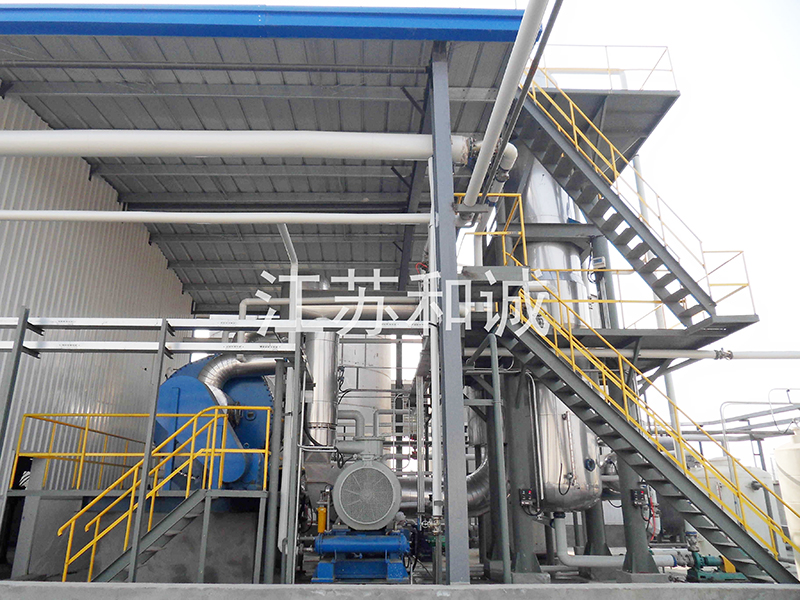Title:Application of MVR in the recovery of high-salt wastewater
As a more energy-saving and stable evaporation technology at present, MVR technology hardly needs to consume steam during operation, which can greatly reduce the cost of enterprises. At the same time, it can be designed as skid-mounted, which is favored by many enterprises.
He Cheng Xiaobian talked with you about the application of MVR technology in the recovery of high-salt wastewater resources.
1��、 MVR technical principle
Mechanical Vapor Recompression (MVR).
MVR is an energy-saving evaporative crystallization technology that reuses the energy of the secondary steam generated by itself in the process of material evaporation to reduce the demand for external energy.
During the operation of the MVR system, the secondary steam generated by the material evaporation is compressed by the compressor, and the electric energy is converted into heat energy, so that the temperature and pressure of the steam are increased, the hot melting of the secondary steam is increased, and the unusable secondary steam is converted into usable steam, and then it is re-entered into the heater of the evaporator as a heat source, making full use of the latent heat of the steam to keep the material liquid boiling, The heating steam itself is condensed into water, and the condensate is used for preheating the materials, so that the sensible heat of the condensate is fully utilized, and the heat energy generated in the whole process is fully utilized, and the amount of raw steam required in the whole evaporation process is very small, so that the steam to be discarded is fully utilized, the thermal efficiency is improved, and the low energy consumption operation of the system is realized.
 Product name: MVR series mechanical steam recompression evaporator
Product No.: B000
2����、 Technical characteristics of MVR evaporation system
Product name: MVR series mechanical steam recompression evaporator
Product No.: B000
2����、 Technical characteristics of MVR evaporation system
Technical characteristics of MVR evaporation system: theoretically, the economy of raw steam is equivalent to 5-10 efficiency of multi-effect evaporation, and the latent heat of secondary steam is fully recycled, and the energy consumption is significantly reduced;
Due to the heat reuse of MVR itself, it can reduce the demand for external heating energy consumption and cooling resources, without large flow of fresh steam and circulating cooling water, and can reduce a large number of auxiliary facilities, such as large boiler rooms and large cooling water towers;
MVR evaporator has compact equipment, small floor area, high degree of automation and simple operation;
Although the initial investment is high, the rate of return is high, and the cost advantage is obvious in 1-2 years on average; MVR evaporator is not recommended for materials with boiling point above 15 ℃.
3���、 Application of MVR in the recovery of high-salt wastewater
1. In the field of wastewater treatment.
For many high-salinity wastewater, the main component is mainly ammonium nitrate, so combined with physical and chemical filter box membrane purification, MVR technology for actual recovery and treatment, and then technical treatment can produce concentrated liquid, which can be used as fertilizer for plants, including fresh water, green plant drip irrigation and toilet flushing in various plants, so the overall social benefits are very significant.
2. Use in the field of salt production.
Many enterprises in China will choose the multi-effect evaporation technology of evaporation technology to treat salt, while in foreign countries, especially in developed countries and regions, salt production is basically MVR technology; I believe that in the future, China will gradually promote it. If MVR technology can be introduced into the field of salt production, it can solve the problem of high overall cost and reduce the actual cost and expense rate.
The zero-discharge process of saliferous wastewater will involve evaporation process. In addition to considering from the process perspective (such as material viscosity, boiling point rise, stew value, thermal sensitivity, corrosivity, etc.), enterprises need to consider the primary investment cost and long-term energy consumption cost comprehensively. The higher the evaporation volume, the lower the comprehensive use cost of MVR.





